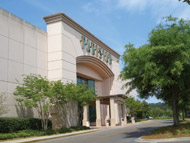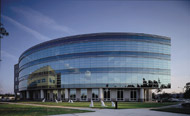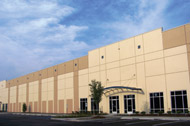|
COVER STORY, NOVEMBER 2006
THE WORD ON THE REITS
REITs still on pace to top market.
Daniel Beaird
Although some analysts say that the REIT market is overvalued, it is still predicted to out pace the stock market for the seventh consecutive year as pension funds and private equity continue to stabilize the REIT market. According to NAREIT Index in October, multifamily REITs lead the growth pattern for the market this year at approximately 34 percent followed by office REITs at close to 29 percent. Retail REITs place last in REIT property types, but they are still almost doubling the stock market’s percentage on returns this year. The REIT market as a whole is hovering around 22 percent on returns this year. In comparison, the Dow Jones and the S&P 500 are averaging approximately 8 to 9 percent on returns. Southeast Real Estate Business spoke with some REITs to find out how the market is doing, what property types they invest in, their properties in the Southeast and what kind of interest the Southeast is drawing.
Feldman Mall Properties
 |
Feldman Mall Properties’ Tallahassee Mall in Tallahassee, Florida.
|
|
Albany, New York-based Feldman Mall Properties (NYSE:FMP) focuses on acquiring enclosed regional malls that are underperforming in major markets or very strong secondary markets. With the recent interest in lifestyle retail components, Feldman Mall Properties focuses renovating their malls to fit this lifestyle movement within an enclosed mall. Currently, Feldman Mall Properties owns seven regional malls across the country including Tallahassee Mall in Tallahassee, Florida. The company’s goal is to renovate and re-tenant these malls to go from Class B sales, approximately $300 per square foot, to Class A sales, approximately $350 to $400 per square foot.
“We like malls in major markets or secondary markets like state capitols,” says Larry Feldman, chairman and chief executive officer of Feldman Mall Properties. “State capitols like Tallahassee, Florida, are somewhat recession resistant in that there is a job base even in a downturn in the economy and there is usually lower unemployment.” For Tallahassee Mall, it was all of those factors plus the growing population of the state of Florida and the two major universities in Tallahassee that attracted Feldman Mall Properties to Tallahassee Mall. “We are going to see a 20 percent population growth in our trade area around Tallahassee,” Feldman says.
“There are only two malls in Tallahassee,” Feldman says. “Tallahassee Mall was not a deeply distressed mall when we purchased it (in 2005), so it won’t take a Herculean effort to raise its sales to a Class A level.” Sales were between $320 and $330 per square foot when Feldman Mall Properties purchased the retail property. The company is adding first-class restrooms, adding lighting, and reconfiguring certain areas at Tallahassee Mall. But, the mall already had two components that the company seeks out: a bookstore, Barnes and Noble Booksellers, and a movie theater. “We usually don’t find those elements already in a mall that we purchase,” Feldman says. “Those are two of the three elements we call the trifecta: movie theaters, bookstores and restaurants.” Feldman Mall Properties usually aims to bring in all three to a renovated property.
The trifecta elements transform Feldman’s malls into pseudo-lifestyle centers. “Years ago, enclosed malls included a series of shops with Sears on one side and JC Penney on the other side of the mall with no entertainment component,” Feldman says. “We would like to think that, today, we are creating a lifestyle center inside a regional mall. We will typically superimpose an entire lifestyle center, consisting of restaurants, bookstores, movie theaters and the like, in front of the mall.”
Building a movie theater inside a regional mall creates advantages for the mall tenants. “In order for the patron to get to the theater, he must walk through the mall. When the patron leaves the theater, he walks back through the mall again, passing all the shops and hopefully shopping on the way out,” Feldman says.
The lifestyle center has overtaken the idea of the enclosed regional mall and Feldman Mall Properties has changed with the times. “We realize that there is a large segment of the population, working women, that drive our tenants’ sales. In order to appeal to working women, we have to make our malls very convenient and as convenient to the outside as possible.”
Feldman Mall Properties also brings in new tenants to its malls to reinvigorate and reestablish the mall’s trade radius. The new tenants help reverse the decline of the past 10 to 20 years that the company typically finds in the malls it acquires. “That’s the challenge of our business is to reestablish and widen the trade area by bringing in new anchor tenants or junior anchor tenants like Cheesecake Factory, L.L. Bean, Bass Pro Shops and P.F. Chang’s China Bistro,” Feldman says.
Feldman Mall Properties has entered the Southeast market with its acquisition of Tallahassee Mall last year. It plans to expand in the Southeast during the years to come. “We like the Southeast’s growing numbers. We typically buy malls at significant discounts and replacement costs, and we are able to find that in the Southeast.” Feldman also searches for a mall with growth around it. “If you reinvigorate a mall with growth around it, people will still come out to the mall. We don’t buy in declining and decaying locations, in which people are moving away from, because no matter what you do as far as renovations, you aren’t going to draw people and survive.”
Feldman Mall Properties will probably acquire about 15 to 20 malls in the next 2 to 3 years, and will continue to focus on major markets as well as secondary markets like Tallahassee. Feldman Mall Properties usually seeks mall properties that are 1 million square feet in size.
Liberty Property Trust
 |
Liberty Property Trust’s Butler Plaza in Jacksonville, Florida.
|
|
Pennsylvania-based Liberty Property Trust (NYSE: LRY) is a $6.5 billion real estate investment trust that owns more than 700 office and industrial properties that are home to 2,100 tenants across the country. Southeast Real Estate Business recently spoke with Larry Gildea, senior vice president, regional director and director of leasing for Liberty Property Trust’s Mid-Atlantic region about the office and industrial market in Maryland, Virginia and the Carolinas.
Liberty Property Trust has provided its tenants with everything including office parks, single office buildings, flex properties, industrial facilities and LEED (Leadership in Environment and Energy Design) certified office buildings.
Liberty Property Trust developed a 1,000-person call center for Aetna Healthcare in its master-planned, 140-acre business park, Medenhall, in the Piedmont Triad of North Carolina. Aetna has also selected Liberty for two additional build-to-suit projects including a 140,500-square-foot office building in Tampa, Florida. Liberty has also acquired a 100,000-square-foot building located at 3020 U.S. Highway 301 in Legacy Park, which is fully leased to The Home Depot.
Also in Tampa, Liberty Property Trust has recently acquired 65 acres of developable land in Legacy Park, centrally located off of Highway 301. “We have seen an increase in office, flex and showroom demand, particularly along Highway 301 where Legacy Park is located,” says Bob Goldschmidt, a senior vice president for Liberty Property Trust. Liberty will phase the development during the next 4 to 5 years with a potential eight to 10 buildings planned. “Developmental regional impact and limited growth regulations in Florida sometimes make it difficult to acquire and develop larger land tracts, so the fact this site is fully approved for development is very exciting because there is little up-time,” Goldschmidt says.
 |
Bridgeway Commerce Center.
|
|
Up along the eastern seaboard, Liberty has opened its second Class A multi-tenant warehouse distribution building at Bridgeway Commerce Center in Suffolk, Virginia. Located on Harbour View Boulevard, the 168,000-square-foot state-of-the-art building compliments Liberty’s campus-like setting in Bridgeway Commerce Center, located in Bridgeway Commerce Business Park. Last year, Liberty completed the 130,000-square-foot Bridgeway Commerce Center I and is currently underway with construction plans for the 126,000-square-foot Bridgeway Commerce Center II. When completed, the projected $20 million multi-tenant warehouse complex, featuring Liberty’s three Class A warehouse buildings, will offer access to all major corridors throughout Hampton Roads, Virginia. Bridgeway Commerce Business Park is currently home to tenants like Sysco Foods, Columbia Natural Gas, Dana Corporation and Lockheed Martin.
“It is hard to find land in the Washington, D.C., corridor for industrial use,” Gildea says. “The future of industrial facilities in the Mid-Atlantic states is in the Hampton Roads area.”
GMH Communities Trust
Covering yet another property type, GMH Communities Trust (NYSE: GCT) is a publicly-traded Maryland real estate investement trust that focuses on providing housing to college and university students residing off campus and to members of the U.S. military and their families residing on or near bases throughout the United States. GMH Communities also provides property management services to third-party owners of student housing properties, including colleges, universities and other private owners.
The company has recently completed the acquisition of 11 student-housing properties from Capstone Development Corporation, including six properties located near Southeastern universities. The properties included University Commons student housing in Athens, Georgia; Baton Rouge, Louisiana; Columbia, South Carolina; Lexington, Kentucky; Starkville, Mississippi; and Tuscaloosa, Alabama.
“We are pleased with our acquisition of these properties,” says John DeRiggi, president of GMH Communities Trust’s student housing division. “We want to advance the premier reputation these properties garner in their respective markets. This increases the size of our owned portfolio to 76 assets containing approximately 46,000 beds; and it fits well demographically within our existing portfolio.”
The purchase price for the entire portfolio is approximately $223 million. It is being funded by borrowings under the company’s new credit facility with Wachovia Bank as well as the placement of approximately $173.4 million in new 10-year, interest-only mortgage indebtness on the 11 properties with a fixed-rate of 5.84 percent. GMH Communities Trust has completed 21 student-housing property acquisitions this year for an aggregate purchase price of approximately $362.8 million.
©2006 France Publications, Inc. Duplication
or reproduction of this article not permitted without authorization
from France Publications, Inc. For information on reprints
of this article contact Barbara
Sherer at (630) 554-6054.
|
